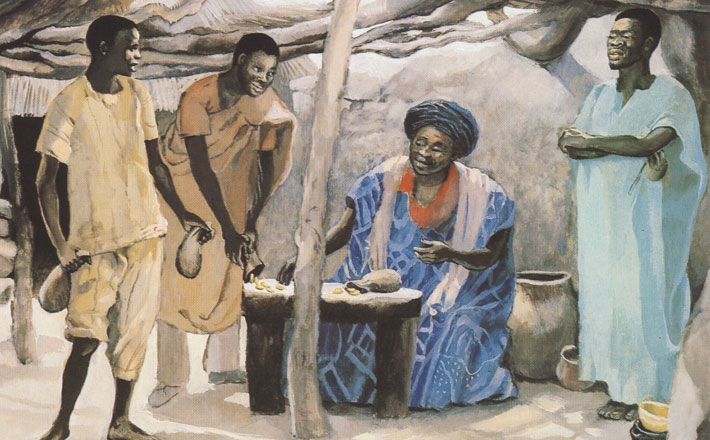Commentary on Zephaniah 1:7, 12-18
Helen Keller was once quoted as saying, “Science may have found a cure for most evils; but it has found no remedy for the worst of them all — the apathy of human beings.”
And, the great Jewish political activist Elie Wiesel said something similar, “The opposite of love is not hate, it’s indifference. The opposite of art is not ugliness, it’s indifference. The opposite of faith is not heresy, it’s indifference. And the opposite of life is not death, it’s indifference.” Though perhaps not as well remembered, the prophet Zephaniah suggested God just might say the same thing.
Zephaniah 1:7 begins the second of a series of nine oracles in the book of Zephaniah. This passage introduces the day of the Lord as a day of sacrifice. Here, Zephaniah portrays God as the priest who will offer the sacrifice, and this is accompanied by two important implications: that Judah is the sacrifice and the guests are armies of destruction (verse 7).1 The sole rubric for this ritual is named at the beginning of the oracle: to be silent in the presence of God.
The implications present in verse seven are more pronounced as chapter one progresses, particularly in verses 12-18. These verses, poetic in nature, emphasize emphatically that God cares about justice. God cares about justice so much that God is willing to search out Jerusalem with lamps for those complacent, indifferent city dwellers who view God as the same (verse 12).
In a near crass metaphor, the writer compares the complacent to spoiled wine dregs. Dregs, the sediments of the grapes, were used in wine making to provide body and color. But, when wine sits too long in dregs, it becomes spoiled, thick, and syrupy — as do those who are unwilling to work for justice (verse 12b). The punishment? Denial. The complacent are denied the fruits of their labor. Though they may work to accumulate wealth and physical possessions, they will not be permitted to enjoy them (verse 13).
After the initial warning against complacency and indifference, Zephaniah repeats once again that the day of the Lord is at hand. This day is coming quickly, and it is not to be a pretty sight, so to speak. Bennett points out that the language identifies God with “the avenging warrior, specifically causing thunderous noise and blood-curdling shrieks of warfare” (verse 14).2 Subsequent verses align the voice of God with the Psalmist’s portrayal of power and majesty, and they heighten the nature of the day as one of ruin, devastation, darkness, and gloom. Indeed, it is no surprise that these verses are often associated with the Dies irae, the medieval Latin hymn which foreshadows the terror of the final judgment (verses 15-16).3
On the day of the Lord, nothing will be able to save the people. Blood will turn to dust and flesh will turn to nothing other than dung. No material possession will be able to save the people, for the Lord will rule and the Lord will see to it that God’s ways are asserted on earth (verses 17-18).
The most immediate application of this passage for preaching might be found in this oft-quoted and nearly clichéd phrase: the opposite of love is nothate, but indifference. Throughout this oracle, Zephaniah the prophet emphasizes emphatically that the day of the Lord is a day for taking a stand.
The day of the Lord is all about calling upon those who are full of indifference and complacency, and determine that God operates in the same way. God’s words, spoken through Zephaniah, indicate the exact opposite. God is not indifferent. God is not complacent. God is actively working to ensure that there will be an ongoing relationship between God and God’s people, and this is the heart of this particular oracle. God is not indifferent, and neither are we as God’s people to be indifferent about our relationship with God, about politics, about the social well-being of all, or about anything else that God cares about.
While the clarion call against indifference might be most readily apparent, it must not go unnoticed that as the liturgical year comes to an end this passage — like many others now — points to “the end.” However, to stop at the end is to read the passage at a surface-level. It is critical for readers and preachers to understand that the end to which Zephaniah points is not a fateful day of doom and gloom. Rather, “the end” is the day of the Lord, and the day of the Lord is that day when God’s rule will be extended over the nations such as Judah and Israel.
The day of the Lord is the day when indifference will no longer be tolerated. The day of the Lord is the day when, out of blood and ashes and flesh and dung, will, in fact, come something good: the promise of a future where God reigns over all people and all things. At the end of the liturgical year, it is important to sound this clarion call: “to know God as God is, one must experience the future revolution.”4 The day of the Lord brings not wrath and judgment, but a future in which all things are made new by the God who cares about the good of all things and all people.
Notes:
1 Robert A. Bennett, “The Book of Zephaniah: Introduction, Commentary, and Reflections,” in The New Interpreter’s Bible: Volume VII, ed. Leander E. Keck, Thomas G. Long, David L. Petersen, et al, The New Interpreter’s Bible: A Commentary in Twelve Volumes (Nashville, TN: Abingdon Press, 1994), 677.
2 Ibid., 682.
3 Ibid., 683.
4 Ibid., 684.


November 16, 2014